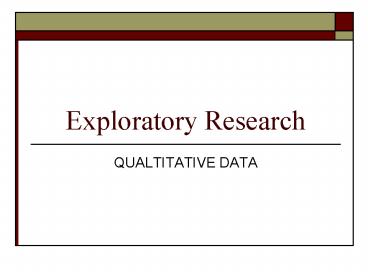Exploratory Research PowerPoint PPT Presentation
1 / 29
Title: Exploratory Research
1
Exploratory Research
- QUALTITATIVE DATA
2
Qualitative Methodologies
- Focus Groups
- In-Depth Interviews
- Projective Techniques
- Observation
3
Definitions (Yuck!)
- Inquiry
- Disguised
- Undisguised
4
Final Definitions (I promise)
- Structured
- Questions
- Answers
- Unstructured
- Questions
- Answers
5
Distinction between
Qualitative Research Quantitative Research
Objective
Sample
Data Collection
Data Analysis
Outcome
6
Qualitative Methods
- An unstructured exploratory methodology based on
small samples that provides insights and
understanding - Researcher dependent i.e., researcher extracts
meaning from unstructured responses - Touchy-feely no numbers unstructured
responses - Examine thoughts, feelings, motivations
- SO
- Can be results be projected to the population?
- Yes or No
- However
- Can spot trends 3 to 4 years before they show up
in surveys
7
1. Focus Groups
- Definition
- Lasts _________
- Types
- Round-table (Comfortable room with one-way
mirror) - Telephone
- Video conferencing
- Internet chat rooms
- Usually multiple groups
8
Uses of Focus Groups
- Obtain impressions on products, packages and
brand names - Evaluate ads
- Develop questionnaires
- Check language for minority or geographically
concentrated populations - Develop hypotheses..
9
Advantages/Disadvantages of Focus Groups
- Disadvantages
- 1.Can not project (or generalize) to population
- 2.Difficult to moderate
- 3.Difficult to interpret
- 4.May be more susceptible to bias
- 5. Not useful for sensitive topics
- Advantages
- 1.Experiencing Consumers
- 2.Immediate information
- 3.Relatively Inexpensive
- 4.Flexible
- 5.Serendipity
- 6.High Respondent Involvement
- 7. Group interaction
10
Focus Group Moderator
- Keeps discussion focused
- Believe that participants have wisdom
- Encourages shy to talk and dominant participants
to be quiet - Should say little, but keep eye contact
- Accepts all answers but do not indicate agreement
with any one answer - Must be a quick study
11
Conducting a Focus Group
- Register participants
- Small talk- bonding
- Introductions
- welcome
- why they are here
- guidelines or ground rules
- opening question
- Ask questions
- Anticipate flow
- Control your reactions
- Probe as needed
- Summarize the discussion
12
Developing Questions for Focus Groups
- Where to Begin
- Clarify the problem first
- Identify questions
- Develop a draft of moderators guide --REVISE,
REVISE, REVISE - General Rules
- Conversation Tone
- Be Clear
- Allow sufficient time to answer
13
Question Categories
- Opening questions
- Introductory questions
- Transition questions
- Key questions
- Ending Questions
14
2. DEPTH INTERVIEWS
- One-on-one interviews between professional
researcher and a respondent - Try to uncover underlying motivations, prejudices
and attitudes lots of probing - Often toward sensitive information
15
Depth Interviewing Analysis
- Lots of Intense Probing
- Laddering building on responses
- Example
- Attributes
- Benefits/Consequences
- Values/Motivations
16
When to use depth interviews
- Sensitive or confidential subject matter
- Situations where strong social norms exist
- Need intensive probing
- When respondent interaction unlikely to be
helpful (e.g., with children) - Have lots of and time
- Need detailed responses
17
Projective Techniques
- Unstructured Indirect form of questioning
- Used when subjects cannot or will not directly
communicate feelings - A man is least himself when he talks in his own
person when he is given a mask he will tell the
truth. - E.g., TATs, inkblot
18
Word Association
- Examine brand/service image
- Measure
- frequency of responses
- no responses
- response latency
- body language
- Example
19
Sentence Completion
- Gives more direction than word association
- Examples
- People who drink imported beer are _____________.
- People who dont give blood are____________.
- I always give blood during blood drives at work
unless________.
20
Unfinished Story
- Finish the story or tell why the person acted the
way he or she did. - Evolved from TAT
21
Third Person Role Play
- What would the typical person do in this
situation? - We tend to think others are like ourselves, yet
we are more willing to tell the truth about
others - Example
- Why would your neighbor buy a Mercedes
22
Haires Shopping List
1 1/2 lbs hamburger 2 loaves Wonder Bread 1 bunch
of carrots 1 Rumfords Baking Powder Maxwell House
coffee (drip ground) 2 cans Del Monte peaches 5
lbs potatoes
- 1 1/2 lbs hamburger
- 2 loaves Wonder Bread
- 1 bunch of carrots
- 1 Rumfords Baking Powder
- Nescafe Instant coffee
- 2 cans Del Monte peaches
- 5 lbs potatoes
23
Haires Results
- Nescafe Shopper
- 48 lazy
- 48 failed to plan purchases
- 4 thrifty
- 12 spendthrift
- 4 good wife
- Maxwell Shopper
- 4 lazy
- 12 failed to plan purchases
- 16 thrifty
- 0 spendthrift
- 16 good wife
24
Cartoon Completion (Picture Frustration)
- Subjects fill in the bubble suggests a dialogue
between the characters
25
Draw a Picture
- Subject given a topic to draw
- Examples
26
Some Boring Definitions
- Ethnographic/Observational Research
- Systematic recording of behavioral patterns of
people, objects, and occurrences as they are
witnessed - Direct Observation
- Indirect Observation
27
Observation can be disguised or undisguised
- HOWEVER CAN NOT UNCOVER COGNITIVE PHENOMENA
(e.g., thoughts, attitudes, motivations) - SO Can NOT explain WHY a behavior occurred
28
Observation of Physical Objects
- Naturalist Inquiry
- Physical Trace evidence
- wear on floor tiles
- pings
- Garbology
- Audits - pantry
29
Mechanical Observation
- Television/Internet
- AC Neilson People Meter
- Click Through Rates
- Scanners
- Eye Tracking
- Psychogalvanometer
- Response Latency

